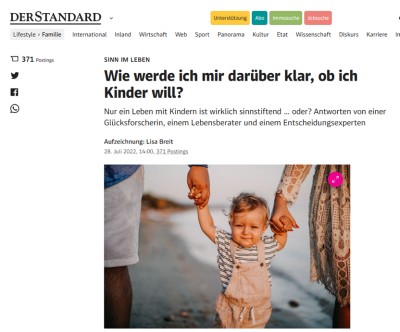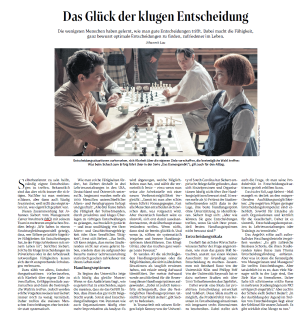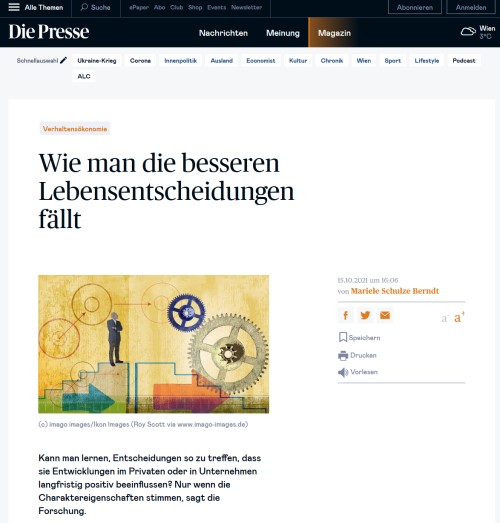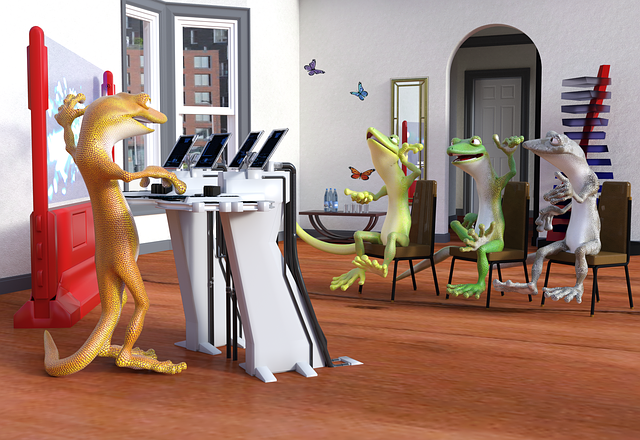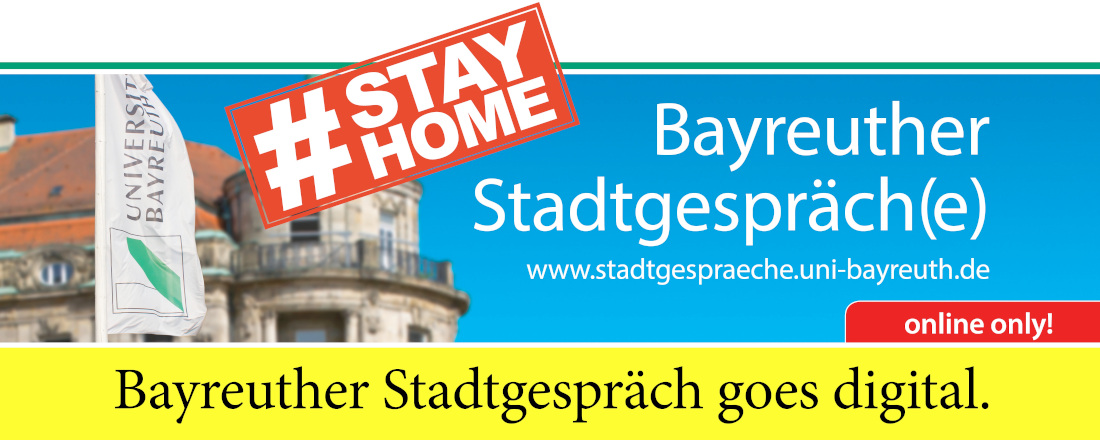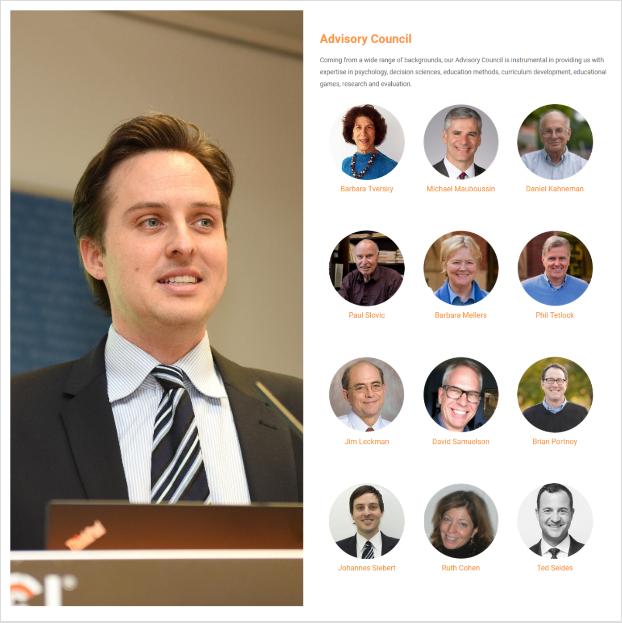“Smart decisions make you really happy”: MCI MOOC top-rated course on iMooX
Smart decisions make people really happy! Within the first nine months, 650 satisfied participants have already learned how to actively make them in our MCI MOOC “Smart Decisions” by Prof. Johannes Siebert. The MOOC is the best-rated course among over 100 courses on the iMooX platform and has a rating of 4.98 out of 5.00 stars. The core of the free MOOC consists of 8 interactive videos with a total length of just over 2.5 hours. In addition, more in-depth teaching materials, reflection exercises and quizzes are provided. Participants are also encouraged to work on their own running example(s). Prof. Siebert explains why many people make bad decisions and how they can avoid that. He presents some simple but effective methods based on recent developments in behavioral economics and decision sciences. The participants learn to make reflective and conscious decisions. Therefore, Prof. Siebert enables the participants to become their own…
How do I get clear about whether I want kids?
The ideal of a large family with children still exists. But many people today are unsure whether they really want that. They may be in their 20s or 30s, their friends are having babies, and they imagine what it will be like. They observe beaming but stressed parents. And they themselves haven’t made up their minds yet – because they’re actually quite happy with the way their lives are right now. At the same time, there’s the fear of missing out. How do you find out what’s right? Lisa Breit spoke with experts from various disciplines about this question: Johannes Siebert is a decision researcher, Melanie Hausler is a psychologist and happiness researcher, and Johannes Frass is a life coach and budding psychotherapist in Vienna. They explain how to make the decision and whether children really do make you happier. You can find the article in the Standard here: https://www.derstandard.at/story/2000137561015/wie-werde-ich-mir-klar-ob-ich-kinder-will
The research project PerFake explores methods to reduce the influence of fake news on individuals
Fake news became a global phenomenon with the 2016 U.S. presidential election and the Brexit referendum, particularly because more and more people are using social media as a source of news without reflection. The spread of fake news on the Internet and its consequences are being intensively discussed in the European Parliament. Nevertheless, so far, there is no clear agreement on how to reduce the influence of fake news. „The problem with fake news is that even if it is flawlessly identified as such, something still „sticks“ – the fake news continues to influence our opinion”, explains Prof. Johannes Siebert, who researches and teaches at MCI | The Entrepreneurial School®. This phenomenon is called „belief perseverance bias“ and explains the great influence of fake news on the formation of opinion and the decision-making behavior of many people. „There are numerous newsrooms and nonprofit organizations that identify fake news. This very…
Fact checks can only be a first step
Fake news: a globalphenomenon with a negative impact on opinions. Professor Johannes Siebert from MCI and Dr. Jana Siebert from Palacky University Olomouc are fighting against this with their project “PerFake”. “Misinformation has always been a part of our society,” says Johannes Siebert. With the Brexit referendum and the 2016 U.S. presidential election, fake news – “misinformation deliberately spread to manipulate opinions,” the professor says – has become a global phenomenon. Ubiquitous. The spread of false facts has been aided in recent years by digital social networks, he said. In particular, by the fact that more and more people living in their Facebook bubble unthinkingly refer to it as a source for news. You can find the full interview here: https://www.unipress.at/wissenschaft/faktenchecks-koennen-nur-ein-erster-schritt-sein/
The luck of the wise decision
Very few people have learned how to make good decisions. Yet the ability to consciously find optimal decisions makes people happier in life. In the Standard, I explain how people can train themselves to make better decisions and, as a result, be more satisfied with their lives. Being self-determined means constantly making your own decisions. As we all know, these are not always the right ones. Afterwards, one is usually smarter, but then also often more frustrated, because what was actually planned did not occur. Johannes Siebert from the Management Center Innsbruck (MCI) and his team have proven this connection in several empirical studies: “We have shown in a structural equation model that those who have higher proactive cognitive abilities for decision-making are subsequently more satisfied with their lives,” Siebert reports. Such skills, which are necessary for making wise decisions in private life or at work, can be improved through…
How to make the better life decisions
Can we learn to make decisions in such a way that they positively influence developments in our private lives or in companies in the long term? Only if the character traits are right, says research. “A large proportion of companies make extremely poor decisions because they are unable to identify their objectives,” explains Johannes Siebert of Management Center Innsbruck (MCI). Only if the company’s objectives and values were defined could they be systematically pursued. If this does not happen, clinging to the status quo reigns instead of proactively initiating change. According to Siebert, making the right decisions is also the basis for entrepreneurial success. In Die Presse, I explain how people can make decisions and subsequently be more satisfied with their lives. Just follow this link. Sources Siebert, Johannes U.; Kunz, Reinhard, Rolf, Philipp. “Effects of decision training on individuals’ decision-making proactivity”, European Journal of Operational Research, 294 (1) 2021,…
Learning to decide wisely and becoming happy: Studies show the effect of training on decision-making behaviour
People who make smart decisions in important private and professional matters increase their chances of greater life satisfaction. The cognitive skills required for this can be significantly honed through training. This is the conclusion reached by researchers at the University of Bayreuth in recent empirical studies published in the European Journal of Operational Research. Courses lasting several weeks with participants of different age and occupational groups demonstrably strengthened their ability to make well-considered choices in difficult decision-making situations.
Give yourself a nudge: How to ‘nudge’ yourself to systematically make better decisions professionally and personally
Decisions are the only way we can actively influence what is important to us or our organization. Everything else ‘happens’. It is therefore surprising that decision-makers leave much potential for improvement untapped. In the September City Talk, numerous tips will be given on how we can systematically make better decisions and thus achieve what is important to us. About it speaks Prof. (FH) PD Dr. habil. Johannes Siebert from the Management Center Innsbruck.
International recognition for MCI Professor Johannes Siebert
Renowned Alliance for Decision Education around Nobel Laureate Daniel Kahneman and Richard Thaler accepts Johannes Siebert into Advisory Council | Recognition for research achievements in the area of individual and organizational decision behavior. MCI-News 12. August 2020 A high-ranking recognition has recently been announced at the Entrepreneurial School®: Johannes Siebert, Professor at the MCI Department of Business and Management and an internationally recognized expert in the study of individual and organizational decision-making behavior, has been accepted into the top-class advisory board of the renowned Alliance for Decision Education around Nobel Prize winner Daniel Kahneman. With his expertise, he will contribute to helping children and young people learn to make conscious and well-considered decisions away from the usual “try & error”. The inclusion of Johannes Siebert in the Advisory Council of the Alliance for Decision Education will help to further increase the international networking and visibility of the MCI. Workshops on…
Die Ziele des Islamischen Staats: Neue Studie zu den Führungspersonen des IS und seinen Anhängern
What does the Islamic State want? Dr. Johannes Siebert at the University of Bayreuth and U.S. researchers at the University of Southern California (USC) have systematically analyzed the IS’s objectives for the first time. The study was recently published in the renowned INFORMS journal Decision Analysis.

